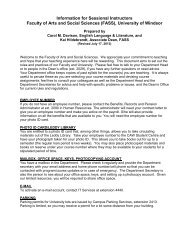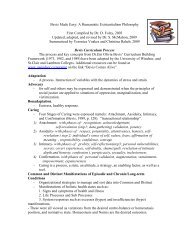No Exit: Racial Profiling and The War Against Terrorism
No Exit: Racial Profiling and The War Against Terrorism
No Exit: Racial Profiling and The War Against Terrorism
You also want an ePaper? Increase the reach of your titles
YUMPU automatically turns print PDFs into web optimized ePapers that Google loves.
41 OSGHLJ 293 Page 10<br />
41 Osgoode Hall L.J. 293<br />
tempt to help widen underst<strong>and</strong>ing, feminist authors use the terms “spirit murder” <strong>and</strong> “spirit injury” to speak about the<br />
psychological harms perpetrated by racism <strong>and</strong> other forms of systematic oppression. [FN79] Patricia Williams defines<br />
spirit-murder as “a disregard for others whose lives qualitatively depend on our regard ... it is a system of formalized distortions<br />
of thought. It produces social structures centered around fear <strong>and</strong> hate.” [FN80] Williams, now Professor of Law<br />
at Columbia University, recounts how a young white male clerk's refusal to let her into a store to buy a gift for her mother<br />
brought back a familiar rage, one borne of racism that she had first experienced in her childhood. [FN81] Of course,<br />
some children can withst<strong>and</strong> racial slurs (“little terrorist,” “s<strong>and</strong> nigger,” or “camel jockey”) [FN82] even when these<br />
slurs come from teachers <strong>and</strong> authority figures who help define their world <strong>and</strong> are entrusted with giving children a sense<br />
of themselves. Others will remain scarred, however, <strong>and</strong> will *312 struggle throughout their lifetimes with the image of<br />
themselves that others have helped create. [FN83]<br />
Over-inclusiveness not only generates harms for innocent people, it also risks alienating the Arab <strong>and</strong> Muslim communities<br />
in the <strong>War</strong> against <strong>Terrorism</strong>. [FN84] <strong>The</strong> point is not that Arabs <strong>and</strong> Muslims support terrorism by default or<br />
that they do not want to contribute to national <strong>and</strong> international anti-terrorism efforts. Rather, the point is that if the laws,<br />
policies, <strong>and</strong> practices that are in place to reach the professed end of fighting terrorism are perceived as ineffective <strong>and</strong><br />
unjust, then individuals who hold such perceptions will be less likely to turn to them. Justice, as the old adage goes, must<br />
not only be done, but must be seen to be done.<br />
Those who support racial profiling despite the over-inclusiveness problem tend to assume that more security necessarily<br />
entails less human rights. That is, racial profiling implicitly relies on a philosophical <strong>and</strong> policy framework that<br />
pits human rights <strong>and</strong> security. [FN85] Thus, if individuals suffer a loss of civil liberties, this is just the price we have to<br />
pay for the <strong>War</strong> against <strong>Terrorism</strong>: fewer human rights means more security. Thus, according to traditional security theorists,<br />
American Airline's decision to eject Walid Shater from his flight <strong>and</strong> denial of his rights are justified because individual<br />
rights must be traded-off for collective security. Some commentators, however, reject this zero-sum relationship<br />
between human rights <strong>and</strong> security. Mariana Valverde, for example, argues that security derives from the relationships<br />
that we cultivate with other people. [FN86] Application of this premise to the <strong>War</strong> against <strong>Terrorism</strong> has the potential to<br />
force a fundamental shift in security strategies. <strong>The</strong> relational theory of security brings back into view the vast majority<br />
of Arabs <strong>and</strong> Muslims in Canada who are not connected to terrorism. At the very least, the relational theory of security<br />
suggests that a person like Walid Shater, a secret service agent trained to identify <strong>and</strong> fight terrorists, is exactly the kind<br />
of person one would want on a flight if one is concerned about terrorism.<br />
*313 C. <strong>Racial</strong> <strong>Profiling</strong> Is Underinclusive or Generates False Negatives<br />
At its root, racial profiling allows decision makers to focus their time <strong>and</strong> resources on a particular segment of the<br />
population that purportedly poses a higher risk than another segment of the population. [FN87] Such an approach may<br />
make sense if the world of terrorism were a frozen laboratory where past events could be relied upon as indicators of future<br />
risk. <strong>Terrorism</strong>, however, thrives on surprises. <strong>The</strong> focus on Al Qaeda in the <strong>War</strong> against <strong>Terrorism</strong> proves underst<strong>and</strong>able<br />
from a psychological perspective given the devastation caused by Osama Bin Laden on 9/11 alone <strong>and</strong> given<br />
his reported connection to other terrorist attacks. However, Osama Bin Laden does not hold a monopoly on violence. Although<br />
Al Qaeda perpetrated the events of 9/11, Al Qaeda is but one of wider number of organizations designated as terrorist<br />
groups by the Office of Counter <strong>Terrorism</strong> in the United States <strong>and</strong> CSIS prior to the 9/11 attacks. [FN88]<br />
Threats of domestic terrorism, for example, have been all but forgotten in the current flurry of public interest over<br />
global terrorism even though the threat of domestic terrorism, including terrorism perpetrated by former <strong>and</strong> active<br />
American military personnel, remains on the horizon. Of course, prior to 9/11, Timothy McVeigh launched the single<br />
© 2010 Thomson Reuters. <strong>No</strong> Claim to Orig. US Gov. Works.





